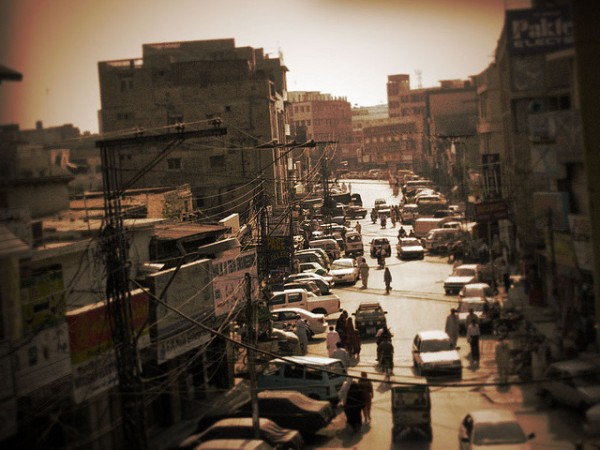
Photo Credit: Ejaz Asi via Flickr
By Wajahat Khan
Though it has disappeared from the headlines, the United States is still making a huge financial investment in my home country of Pakistan, or more accurately in “Af-Pak”, the single theater of operations shared with Afghanistan in which Al Qaeda, the Taliban, nuclear weapons and deep political instability co-exist in a living nightmare scenario. After its long, bloody and expensive war in Afghanistan, the U.S. is spending billions of dollars in direct aid and military support in the region, aimed at building institutions that can help tame the growing extremist chaos that threatens to topple governments in Islamabad and Kabul. We don’t have a minute – or a penny — to waste in these efforts.
U.S. aid in Pakistan is predicated on the understanding that improvements in transparency, accountability and democracy can yield public confidence and broader civic participation. In turn, these bring good governance and economic growth, which can reduce the marginalization and despair that breed extremism. But despite the best intentions of the U.S., good money is going after bad in Pakistan, one of the most corrupt countries in the world.
U.S. taxpayers are pouring money into corrupted Pakistani organizations including some that are themselves — without a shred of irony — dedicated to anti-corruption efforts. Not only is this a waste of money, it is entirely counterproductive: Despite its hefty aid package, the U.S. remains widely distrusted and disliked on the “street,” and cynicism among ordinary Pakistanis towards their institutions remains sky high.
I have served as a journalist in Pakistan for more than a decade, and I have seen the frustrations and the dashed hopes of ordinary people in the face of widespread corruption and cronyism. Years ago, I served as a journalism fellow with Transparency International (TI), the well-known Berlin-based anti-corruption watchdog. Among its other work, TI produces a popular annual corruption index. (Pakistan ranked 126 out of 175 countries in 2014.) But what I found in my time at TI, and subsequently uncovered in my reporting, was evidence of corruption in its Pakistan chapter, Transparency International Pakistan (TIP).
The U.S. Agency for International Development (USAID) spends hundreds of millions of American tax dollars promoting development and good governance in Pakistan, including multimillion dollar grants to TIP to operate an “anti-corruption hotline.” However, the leadership of TIP routinely abuses its authority to intimidate and settle scores, as well as for financial and political benefit. Indeed, in direct violation of TI and USAID rules against nepotism, the USAID-sponsored hotline is being run by the son of the controversial former chairman of TIP, who is still currently a senior member of the TIP team. Fawad Gilani, son of former Chairman and current senior advisor Adil Gilani, is the Program Manager for the USAID-funded program. According to TIP’s own filings, Fawad has taken USAID-funded trips to exotic locations such as Nepal and South Africa, in addition to making the rounds in Washington, D.C. and Germany. Additionally, numerous complaints against his father’s consulting contracts have never been investigated.
Among those complaints is a lawsuit brought by TIP against Emaar Giga, a UAE property developer. Adil Gilani, then chairman of TIP, received payments and consulted for a competing development in the same neighborhood called Arkadians. This conflict was undisclosed by the then-chairman, and the Arkadians project he advocated is itself now mired in court for being illegally built on land meant for a school and a sewerage treatment plant and for shoddy construction practices.
I am not the only one to have voiced concerns about this suspect USAID-sponsored “watchdog”; incumbent cabinet members, award-winning journalists, senior bureaucrats, leading industrialists and even courageous insiders, have spoken about how TIP holds public and private institutions hostage, for personal benefit, but parades around with the institutional backing of donors like USAID. One whistleblower — a highly qualified academic who served as a trustee of TIP, no less — first sounded the alarm about TIP in 2013. She spoke out about conflicts of interest among the leadership at TIP and their efforts to improperly influence federal anti-graft investigations, intimidate and damage various companies with a media-smearing campaign in order to extract personal benefits, and target multinational investors in Pakistan who compete with their own business interests.
What we need is for the U.S. to condition its aid to such Pakistani institutions on reforms of accountability and anti-corruption policies. We need USAID to improve its oversight and follow-through on grants like the one to TIP to ensure that good money is being put to good use. We need the U.S. to push TI headquarters in Berlin to hold its franchises to account. With all due respect, the U.S. can’t just tick the box of ‘aid granted’ and move on. We are playing with precious American tax dollars and the fate of a strategically critical region.
There is an urgent need for transparency in Pakistan. As a matter of fact, organizations such as Transparency International are required here. But when the watchdog is not being watched, the corruption culture here allows it to become the fox watching the henhouse. This is not something the U.S., after such sacrifice, should abide or abet.
Waj Khan, a former Fellow at Transparency International Pakistan, is Director of the Bureau for Investigative Reporting in Pakistan